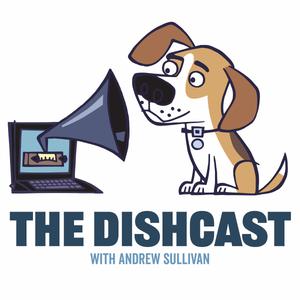
The Dishcast with Andrew Sullivan
Andrew Sullivan
"To see what is in front of one's nose needs a constant struggle," - Orwell
- 49 minutes 39 secondsAdam Moss On The Artistic ProcessThis is a free preview of a paid episode. To hear more, visit andrewsullivan.substack.com
Adam is the best magazine editor of my generation, and an old friend. From 2004 to 2019, he was the editor-in-chief of New York Magazine, and before that he edited the New York Times Magazine, and 7 Days — a weekly news magazine covering art and culture in NYC. His first book is The Work of Art: How Something Comes from Nothing.
For two clips of our convo — on the bygone power of magazines, and the birth of the great and powerful performance artist Dina Martina — pop over to our YouTube page. Other topics: his upbringing on Long Island; fantasizing about NYC through the cosmopolitanism of magazines; being a “magazine junky extremely early”; the literary journalism of the ‘60s; Gay Talese; Joan Didion; Tom Wolfe; Adam’s early start at The Village Voice; 18-hour workdays; joining Rolling Stone then Esquire; commissioning Frank Rich’s groundbreaking piece on gay culture; the visual strength of mags; 7 Days “doomed from the start” because of a stock market crash; the NYT’s Joe Lelyveld hiring Adam to “make trouble” with creative disruption; Tina Brown; “the mix” of magazines like a dinner party; the psychodrama of writers clashing with colleagues; how the Internet killed magazines; the blogosphere; podcasting; the artist Cheryl Pope and her series on miscarriages; Tony Kushner’s Angels in America; when creation is tedious and painful; Leaves of Grass and its various versions; Montaigne’s essays; Pascal and the incompleteness of The Pensées; Amy Sillman painting over her beautiful work; Steven Sondheim; choreographer Twyla Tharp; poetry as the concentration of language and the deconstruction of how we speak; poets Marie Howe and Louise Gluck; the fiction writer George Saunders; how weed suppresses the ego; and Adam’s preternatural calm.
Browse the Dishcast archive for an episode you might enjoy (the first 102 are free in their entirety — subscribe to get everything else). Coming up: Oren Cass on Republicans moving left on class, Noah Smith on the economy, Bill Maher on everything, George Will on Trump and conservatism, Lionel Shriver on her new novel, Elizabeth Corey on Oakeshott, and the great Van Jones! Please send any guest recs, dissents, and other comments to [email protected].
10 May 2024, 5:46 pm - 58 minutes 50 secondsJohann Hari On Ozempic And Big FoodThis is a free preview of a paid episode. To hear more, visit andrewsullivan.substack.com
My old and dear friend Johann just released his latest book, Magic Pill: The Extraordinary Benefits and Disturbing Risks of the New Weight-Loss Drugs. That follows Chasing the Scream: The First and Last Days of the War on Drugs (2015), Lost Connections: Uncovering the Real Causes of Depression (2018), and Stolen Focus: Why You Can’t Pay Attention (2022), which we covered on the Dishcast.
For two clips of our convo — on the ways Big Food gets us hooked, and the biggest risk of Ozempic — pop over to our YouTube page. Other topics: Johann’s struggles with food growing up; how his Swiss dad’s healthy eating habits clashed with his Scottish mom’s processed food; how the obesity crisis started in 1979; the comfort and convenience of junk food; 78 percent of calories consumed by kids today are ultra-processed; how ads hook them at an early age; why the government should regulate food companies like Japan does; Johann’s own experience with Ozempic over the past year; how such drugs boost satiety; nausea and other side effects; the dangers for those with thyroid issues and anorexia; ten other risks he highlights; the ease of getting Ozempic; how people on it lose the pleasure of eating; how the disruption of food habits surface psychological problems; bariatric surgery; Fen Phen and its $12 billion settlement; the dangers of obesity that include diabetes and cancer; how victims of sexual abuse put on weight as a deterrent to abusers; the resilience of fatphobia; why The Biggest Loser is an “evil f*****g show”; why weight-loss drugs feel like cheating; why they might inhibit reform in the food industry; when Johann was fat-shamed by the Dalai Lama; why exercise is great for your health but not really for weight loss; and why I might start taking Ozempic myself.
In fact, I just started. Took my first dose yesterday. I’m struck by how utterly simple it is. A teeny-tiny injection from a teen-tiny needle once a week. I’ll keep you posted if anything interesting happens.
Browse the Dishcast archive for an episode you might enjoy (the first 102 are free in their entirety — subscribe to get everything else). Coming up: Nellie Bowles on the woke revolution, Adam Moss on the artistic process, Oren Cass on Republicans moving left on class, Noah Smith on the economy, Bill Maher on everything, George Will on conservatism, Elizabeth Corey on Oakeshott, and the great and powerful Van Jones! Please any guest recs, dissents, and other comments to [email protected].
3 May 2024, 5:38 pm - 41 minutes 49 secondsKara Swisher On Big Tech And MediaThis is a free preview of a paid episode. To hear more, visit andrewsullivan.substack.com
Kara is a journalist who has covered the business of the Internet since 1994. She was the cofounder and editor-at-large of Recode, and she's worked for the NYT, the WaPo, and the WSJ. She’s now the host of the podcast “On with Kara Swisher” and the co-host of the “Pivot” podcast with Scott Galloway, both distributed by New York Magazine. Her new memoir is Burn Book: A Tech Love Story. It’s a fun read, and it was good to hang out with her again after many years. We were both web pioneers and it’s good to remember those days of the blogosphere. And we get fiery at times.
For two clips of our convo — debating how woke the MSM really is, and how readers are smarter than journalists — pop over to our YouTube page. Other topics: Kara’s rough childhood on Long Island; losing her dad at an early age and contending with a bad stepdad; her military family and her interest in serving; how DADT made things worse for gays; being an AIDS quilt folder; lesbian tropes; our mutual dislike of Pride parades; her fearlessness as a young reporter; The McLaughlin Group; the condescension of legacy media; tycoons who buy media outlets; Jeff Bezos; Marty Peretz; Friendster, Zip2 and Suck.com; how Facebook was seen as a savior for media; how trolls are chagrined when you talk to them; how Zuckerberg is “lovely but awkward” in person; Bill Gates; Peter Thiel; how gay hookups drove the early internet; how the apps kill serendipity; the power of podcasts for community; how the right innovated direct mail and talk radio; Obama’s pioneering with web outreach; how Twitter made January 6 (and Trump himself) possible; Kara watching every single episode of The Apprentice; how Trump’s act is getting stale; how social media is not a good business model; Elon Musk; buying Twitter to “make him more interesting at parties”; the Walter Isaacson bio; Elon’s vile tweets on Paul Pelosi; his trans daughter; ketamine; Mark Cuban on DEI; abortion in the 2024 election; how social media is fracturing and losing appeal with Gen Z; the decline of cable news; the disinfo on unarmed black men killed by cops; how BLM led to more black lives lost; the grievance-industrial-complex of the right; how its reactionaries just want to “burn s**t down”; why Kara is a China hawk; why she disagrees with Jon Haidt; the TikTok ban; the Twitter Files; Hunter’s penis; Tipper Gore and dirty lyrics; and how Kara counsels her four kids about social media and porn.
Browse the Dishcast archive for an episode you might enjoy (the first 102 are free in their entirety — subscribe to get everything else). Coming up: Adam Moss on the artistic process, Johann Hari on Ozempic, Nellie Bowles on the woke revolution, Noah Smith on the economy, George Will on Trump and conservatism, Bill Maher on everything, and the great Van Jones! Send any guest recs, dissents, and other comments to [email protected].
19 April 2024, 3:37 pm - 48 minutes 55 secondsEli Lake On Israel, Anti-Semitism, KanyeThis is a free preview of a paid episode. To hear more, visit andrewsullivan.substack.com
Eli is a journalist and friend. He’s a former senior national security correspondent for The Daily Beast and Newsweek, and a former columnist for the Bloomberg View. He’s now a reporter for The Free Press, a contributing editor at Commentary Magazine, and the host of his own podcast, The Re-Education. I thought I should have a strong Israel supporter to come on and challenge my recent columns.
For two clips of our convo — on the West Bank settlements, and Trump’s record on Israel — pop over to our YouTube page. Other topics: Eli raised as a latchkey kid in Philly; his leftwing Jewish parents; turning neocon in college during the ‘90s PC wars; Milton Friedman’s Free to Choose a formative book; Eli’s love of rap from an early age; Tribe Called Quest and the Native Tongue movement of “rap hippies”; Black Nationalism; David Samuels’ story on white kids driving hip-hop; Kanye’s genius and grappling with his anti-Semitism; the bigotry of Ezra Pound and T.S. Eliot; Nietzsche’s madness; the persistence of Jew hatred across history and cultures; dissidents in the Catholic Church; Augustine; Jewish mysticism and Kabbalah; the faux sophistication of conspiracy theorists; Bob Dole as a Gen Xer; envy and resentment over Israel’s success; the First Intifada; Labor Zionism; Ben-Gurion and Arab resistance; Menachem Begin; Netanyahu’s dad; the IRA bombing British leaders; Arafat walking away from Camp David; the Second Intifada; 9/11 and Islamofascism; the Iraq War and Abu Ghraib; the settler movement and Judeo-fascists; Jared Kushner; the Abraham Accords; Arabs serving in the Knesset; Israel withdrawing from Gaza and southern Lebanon; the evil of Hamas; Yossi Klein Halevi; the IDF’s AI program; the tunnels and 2,000-lb bombs; Dresden; John Spencer’s Understanding Urban Warfare; Rafah; Trump’s vanity; Soleimani and the Damascus embassy; and the US supplying weapons to Israel.
Browse the Dishcast archive for an episode you might enjoy (the first 102 are free in their entirety — subscribe to get everything else). Next up: Kara Swisher on Silicon Valley. After that: Adam Moss on the artistic process, George Will on Trump and conservatism, Johann Hari on weight-loss drugs, Noah Smith on the economy, Nellie Bowles on the woke revolution, Bill Maher on everything, and the great Van Jones! Send any guest recs, dissents, and other comments to [email protected].
12 April 2024, 5:02 pm - 46 minutes 31 secondsNeil J. Young On The Gay RightThis is a free preview of a paid episode. To hear more, visit andrewsullivan.substack.com
Neil is a writer and historian. He used to be a contributing columnist at The Week, and he now co-hosts the “Past Present” history podcast. His first book was We Gather Together: The Religious Right and the Problem of Interfaith Politics, and his new one is Coming Out Republican: A History of the Gay Right.
For two clips of our convo — on when the Postal Service snooped on gay men’s letters, and Trump’s growing support among gays and lesbians — pop over to our YouTube page. Other topics: growing up a gay kid in a Baptist family in central Florida; college at Duke then Columbia while living in NYC for two decades; how gays are a unique minority because they’re born randomly across the US; the Best Little Boy in the World syndrome; the libertarian tradition of gay activists; the Mattachine Society; the obscure importance of Dorr Legg and One magazine; the Lavender Scare; the courage of Frank Kameny; how “privileged” white men had more to lose by coming out; the fundraising power of Marvin Liebman; his close friendship with Bill Buckley; the direct-mail pioneer Terry Dolan; Bob Bauman’s stellar career in the GOP until getting busted for prostitutes; Michael Barone; David Brock; Barney Frank’s slur “Uncle Tom Cabin Republicans”; the AIDS epidemic; how the virus sparked mass outings and assimilation; gay groups decimated by the disease; why gay Republicans wanted to keep the bathhouses open; John Boswell’s history on gay Christians; my conservative case for marriage in 1989; the bravery of Bruce Bawer and Jon Rauch; the early opposition to marriage by the gay left and Dem establishment; HRC’s fecklessness; the lies and viciousness of gay lefties like Richard Goldstein; Randy Shilts despised by fellow gays; Bayard Rustin; war hero Leonard Matlovich; how DADT drummed out more gays from the military than ever before; Clinton’s betrayal with DOMA; the peerless legal work of Evan Wolfson and reaching across the ideological aisle; how quickly the public shifted on marriage; the Log Cabin Republicans in the early ‘00s; Dubya’s marriage amendment; his striking down of the HIV travel ban; PEPFAR; Ken Mehlman; Tim Gill; Kennedy’s opinion in Obergefell; Gorsuch’s opinion in Bostock; Buttigeig’s historic run; the RNC’s outreach to gays in 2019; Jamie Kirchick’s book; Caitlyn Jenner; the groomer slur; the conflict between homosexuality and transness when it comes to kids; Tavistock; and the new conversion therapy.
Coming up on the Dishcast: Eli Lake on Israel and foreign affairs, Kara Swisher on Silicon Valley, Adam Moss on the artistic process, George Will on Trump and conservatism, Johann Hari on weight-loss drugs, Noah Smith on the economy, Nellie Bowles on the woke revolution, Bill Maher on everything, and the great Van Jones! Please send any guest recs, dissents, and other pod comments to [email protected].
5 April 2024, 5:44 pm - 39 minutes 19 secondsDaniel Finkelstein On Hitler, Stalin, And His Mum And DadThis is a free preview of a paid episode. To hear more, visit andrewsullivan.substack.com
Danny is a journalist, politician, and old friend. Formerly an adviser to Prime Minister John Major, he was appointed to the House of Lords in 2013. He’s a former executive editor of The Times of London and is still there as a weekly political columnist. He’s also a director of Chelsea Football Club. His latest book is Two Roads Home: Hitler, Stalin, and the Miraculous Survival of My Family (the title in the UK is way, way better: Hitler, Stalin, Mum and Dad). It’s an astonishingly well-researched thriller of a story.
For two clips of our convo — comparing the horrors of the Soviets and the Nazis, and whether Anne Frank would have been a Justin Bieber fan — pop over to our YouTube page. Other topics: growing up in Hendon (“my parents chose it because it wasn’t exciting”); his grandfather Alfred as “one of the great archivists of the 20th century”; his work contributed to the Nuremberg and Eichmann trials; The Protocols of the Elders of Zion; the Hitler/Stalin pact; their carving up of Poland; the purging of the bourgeois; “If you spoke Esperanto or had stamp collection you were considered a spy”; the horrific cattle-trucks into the Soviet interior meant to cull the weak; the gulags; the state collective farms; working for your food; keeping captives on the bring of starvation; the Katyn Massacre; the devastation in Ukraine; Danny’s relatives who knew Anne Frank as a neighbor in Amsterdam; the dangerous extremes of group identity; “the liberating value of truth”; the main crime of the Jews was their success; the question of Zionism; the Jewish Labour tradition; Danny’s experience as a Jewish Tory; and his mum attending his induction into the House of Lords.
Browse the Dishcast archive for an episode you might enjoy (the first 102 are free in their entirety — subscribe to get everything else). Coming up: Neil J. Young on his history of the gay right, Eli Lake on Israel and foreign affairs, Adam Moss on the artistic process, Johann Hari on weight-loss drugs, Bill Maher on everything, George Will on Trump and conservatism, and Nellie Bowles on the woke revolution. Please send any guest recs, dissents, and other pod comments to [email protected].
29 March 2024, 5:17 pm - 41 minutes 36 secondsRichard Dawkins On God, Sex, RaceThis is a free preview of a paid episode. To hear more, visit andrewsullivan.substack.com
Richard is a scientist, author, and public speaker. From 1995 to 2008 he was the Charles Simonyi Professor of the Public Understanding of Science at Oxford, and he's currently a Fellow of the Royal Society and of the Royal Society of Literature. Among his many bestselling books are the The Selfish Gene, The God Delusion, and his two-part autobiography, An Appetite for Wonder and A Brief Candle in the Dark. He also has substack called The Poetry of Reality — check it out and subscribe!
A pioneering New Atheist, Dawkins is a passionate defender of science and denigrator of religion. Who better to talk to about God? For two clips of our convo — on whether faith is necessary for meaning, and which religion is the worst — pop over to our YouTube page.
Other topics: Richard growing up in England and colonial Africa; his father serving as an agricultural officer; the paternalistic racism of that period; Orwell’s “Such, Such Were the Joys”; genetic variation and natural selection; how evolution is “stunningly simple” but yields “prodigious complexity”; the emergence of consciousness; the crucial role of language for humans; how our intelligence will destroy us; life on other planets; birds-of-paradise and seducing the opposite sex; how faith and the scientific method aren’t mutually exclusive; Einstein’s faith; Pascal; Oakeshott; religious practice over doctrine; the divinity of nature; Richard’s love of cathedrals and church music; Buddhism; virgin births and transubstantiation; Jesus as a moral teacher; his shifting of human consciousness; the Jefferson bible; Hitchens; GK Chesterton; Larkin; Richard as a “cultural Anglican”; gender as “fictive sex”; gamete size; respecting pronouns; science and race; tribalism and “the other”; the complex blend of genetics and culture; the heritability of intelligence; the evolutionary role of religion; the heretical violence of Islam; gays in the Catholic Church; falling rates of religious faith; Judith Butler’s new book; and my awful experience on Jon Stewart’s now-terminated show.
Browse the Dishcast archive for an episode you might enjoy (the first 102 are free in their entirety — subscribe to get everything else). Next up: Daniel Finkelstein on his memoir Hitler, Stalin, Mum and Dad, and Neil J. Young on his history of the gay right. After that: Johann Hari on weight-loss drugs, Adam Moss on the artistic process, and George Will on Trump and conservatism. Please send any guest recs, dissents, and other pod comments to [email protected].
22 March 2024, 5:59 pm - 47 minutes 28 secondsAbigail Shrier On Therapy For KidsThis is a free preview of a paid episode. To hear more, visit andrewsullivan.substack.com
Abigail is an independent journalist and author. Her first book, Irreversible Damage: The Transgender Craze Seducing Our Daughters, was a bestseller, and her new book is a bestseller even the NYT has had to recognize eventually. It’s called Bad Therapy: Why The Kids Aren’t Growing Up. She also has a substack, The Truth Fairy. Check it out.
For two clips of our convo — on the news of UK restricting puberty blockers, and the harm that therapy can do to normal kids — pop over to our YouTube page. Other topics: the brittle bones and teeth-splitting that result from puberty blockers; their effect on IQ; when blockers are necessary; the suicide canard with trans kids; the radio silence around Bostock; how 40 percent of kids are in some form of therapy — “awash in psychopathology”; kids publicizing their mental health on social media; How to Talk So Kids Will Listen; the work of Haim Ginott; “neurotic hovering parents” who rarely correct bad behavior; parents giving up authority; dysregulated kids; Abigail’s upbringing; my tumultuous childhood; Gabor Maté; drug addiction and childhood trauma; iatrogenesis; smartphones; Covid; social emotional learning; why breathwork and mindfulness doesn’t work for kids; how SSRIs can kill adolescent sex drive as it’s developing; Richard Bing’s study on convicts and PTSD; the benefits of therapy for adults; psychotherapy as a literary practice; how therapy has filled the void of religion; kids rushing to become “LGBTQ” because it’s valorized; gay kids today are more accepted but more miserable; the parents who use their trans kids as props; the benefits of same-sex schools; the spike in days off for mental health; and the current cover-story by Andrea Long Chu.
Browse the Dishcast archive for an episode you might enjoy (the first 102 are free in their entirety — subscribe to get everything else). Coming up: Richard Dawkins on religion, Johann Hari on weight-loss drugs, Adam Moss on the artistic process, and George Will on Trump and conservatism. Please send any guest recs, dissents, and other pod comments to [email protected].
15 March 2024, 6:00 pm - 43 minutes 19 secondsChristian Wiman On God And SufferingThis is a free preview of a paid episode. To hear more, visit andrewsullivan.substack.com
Christian is a poet and author, and, in my view, one of the most piercing writers on faith in our time. He served as the editor of Poetry magazine from 2003 to 2013, and his work has appeared in The Atlantic, Harper’s Bazaar, The New Yorker, the NYT Book Review and others. He’s the author, editor, or translator of more than a dozen books, and his new one is called Zero at the Bone: Fifty Entries Against Despair. Matt Sitman and I did a pod episode with him 12 years ago; so it was a real delight to reconnect for a second. I think it’s one of the best episodes we’ve yet produced. But make up your own mind.
For two clips of our convo — on finding God through suffering, and getting a glimpse of the divine through psychedelics — pop over to our YouTube page. Other topics: growing up in poverty and trauma in West Texas; his father was a Bible salesman turned doctor but volatile and addiction-prone; murder-suicide in his extended family; Christian’s anger over his upbringing; discovering poetry in college was a life preserver; the silence found in the middle and end of poems; Emily Dickinson’s dashes; Zadie Smith; how pure joy is destabilizing; C.S. Lewis; how the comforts of modern life insulate us from the ultimate questions; Pascal; the voiceless film Into Great Silence; Terrence Malick; me contemplating the Trinity on MDMA; an argument between Jesus and Nietzsche on magic mushrooms; how Nietzsche drove Christian away from God in college but eventually strengthened his faith; eternal return; “Christ is much larger than Christianity”; my friend Patrick who perished from AIDS; Christian facing oblivion with cancer many times; questioning his own faith constantly; Aeschylus; Rumi; Montaigne; Leonard Cohen; eternity as a release from time; Augustine on time; Job and undeserved suffering; theodicy; Anna Kamieńska’s poem “A Prayer That Will Be Answered”; Larkin’s “Church Going” and “This Be The Verse”; Auden; Carlo Rovelli and perception; and the profound feminism of Jesus.
Browse the Dishcast archive for an episode you might enjoy (the first 102 are free in their entirety — subscribe to get everything else). Coming up: Abigail Shrier on why the cult of therapy harms children, Richard Dawkins on religion, Johann Hari on weight-loss drugs, Adam Moss on the artistic process, and George Will on Trump and conservatism. Please send any guest recs, dissents, and other pod comments to [email protected].
8 March 2024, 6:45 pm - 39 minutes 55 secondsRob Henderson On Overcoming TraumaThis is a free preview of a paid episode. To hear more, visit andrewsullivan.substack.com
Rob is a young independent writer. His work has been featured in the NYT, the WSJ, the Boston Globe and others, and he writes a popular substack that coined the term “luxury beliefs.” He had a tumultuous childhood in foster care, joined the Air Force at 17, and went on to graduate from Yale and Cambridge. He tells that story in his first book, Troubled: A Memoir of Foster Care, Family, and Social Class.
For two clips of our convo — on attending Yale during the Halloween costume meltdown, and how to reform the foster care system — pop over to our YouTube page. Other topics: born into poverty in LA; an absent father; a drug-addicted mom who grossly neglected him; her arrest and deportation; entering foster care at age 3; having his first beer at age 5; his social worker being the most stable figure in his childhood; seven different homes by age 8; an eccentric foster mom who used Rob for free labor and nearly let him drown in her swimming pool; finally adopted by parents — who divorced 18 months later; the adopted father who cut him off; the adopted mother who partnered with a woman — who suffered a near fatal gunshot; growing up in the working-class Central Valley; constantly getting into fights; constantly using drugs and booze; drunk-driving on the reg; getting terrible grades; barely graduating high school; enlisting in the Air Force at 17 and serving eight years; entering rehab at 24; his life saved by a standardized test in the military; how the SATs are a life-line for marginalized teens; Rob getting into Yale; being mystified by the “luxury beliefs” and victim culture of his privileged peers; micro-aggressions and emotional labor; Orwell on oikophobia of the intelligentsia; the high marriage rates of liberal elites; Google’s Gemini trying to indoctrinate the masses with CRT; and the importance of a stable family above all else.
Browse the Dishcast archive for an episode you might enjoy (the first 102 are free in their entirety — subscribe to get everything else). Coming up: Christian Wiman on resisting despair as a Christian, George Will on Trump and conservatism, Abigail Shrier on why the cult of therapy harms children, Adam Moss on the artistic process, and Richard Dawkins on religion. Please send any guest recs, dissents, and other pod comments to [email protected].
1 March 2024, 5:36 pm - 47 minutes 13 secondsJeffrey Rosen On Virtue And LearningThis is a free preview of a paid episode. To hear more, visit andrewsullivan.substack.com
Jeff is the president and CEO of the National Constitution Center, where he hosts “We the People,” a weekly podcast of constitutional debate. He is also a professor of law at the George Washington University Law School, and a contributing editor at The Atlantic. A former house-mate of mine and friend for 40 years, Jeff began his journalistic career writing some stellar essays on the Supreme Court in the TNR when I was editor. The author of many books, his new one is The Pursuit of Happiness: How Classical Writers on Virtue Inspired the Lives of the Founders and Defined America.
You can listen right away in the audio player above (or on the right side of the player, click “Listen On” to add the Dishcast feed to your favorite podcast app). For two clips of our convo — on the transcendence of deep reading in the age of distraction, and the hypocrisy of many Founding Fathers on slavery — pop over to our YouTube page.
Other topics: growing up in NYC with a father who’s a renowned hypnotherapist and a mother who’s a social worker; educated at the Dalton School — “a beacon of liberalism”; reconciling faith with reason; the intellectual tradition in Catholicism; God as reason (logos); Jeff’s deep reading during Covid; Seneca’s essays on time; Cicero’s treatise on old age; Aurelius’ Meditations; Ben Franklin’s 13 virtues; temperance and prudence; Socrates; Plato; Aristotelian balance; Pythagorus; Blazing Saddles; “without virtue happiness cannot be”; Jefferson’s 12 virtues; his rank racism and contradictions over liberty; Sally Hemings; George Wythe freeing his slaves; the Founders building a new society based on ancient wisdom; Cicero at the center of that project; the Bhagavad Gita; the Stoics as Taoist; John Adams as tempestuous and striving for humility; treating his brilliant wife as his equal; making up with his enemies (e.g. Jefferson); Madison and the Federalist Papers; Douglass teaching himself to read; Freud and the substitute of character for personality; delayed gratification; “everything goes to s**t in the Sixties”; Gen Z’s pursuit of happiness ending in anxiety; the quiet life of the 18th century vs the “dazzling array of distractions” today; regaining concentration through deep reading; how all the great books of the ancient world are free online; balance, deliberation, and equanimity as keys to good government; the preternatural calm of Obama; the danger of demagogues; Trump as the anti-Christ of liberal democracy and the antithesis of the Founders.
Browse the Dishcast archive for an episode you might enjoy (the first 102 are free in their entirety — subscribe to get everything else). Coming up: Rob Henderson on class and “luxury beliefs,” Christian Wiman on resisting despair as a Christian, George Will on Trump and conservatism, Abigail Shrier on why the cult of therapy harms children, Adam Moss on the artistic process, and Richard Dawkins on religion. Please send any guest recs, dissents, and other pod comments to [email protected].
23 February 2024, 5:48 pm - More Episodes? Get the App
Your feedback is valuable to us. Should you encounter any bugs, glitches, lack of functionality or other problems, please email us on [email protected] or join Moon.FM Telegram Group where you can talk directly to the dev team who are happy to answer any queries.
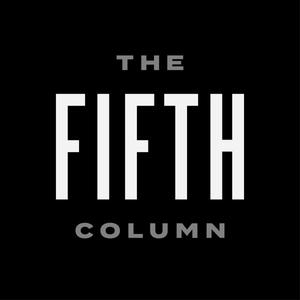 The Fifth Column
The Fifth Column
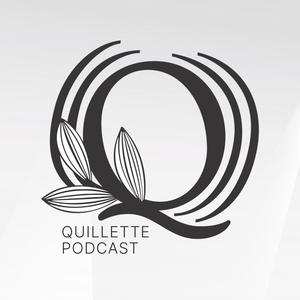 Quillette Podcast
Quillette Podcast
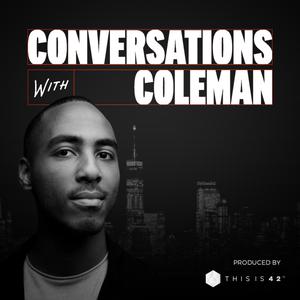 Conversations With Coleman
Conversations With Coleman
 Blocked and Reported
Blocked and Reported
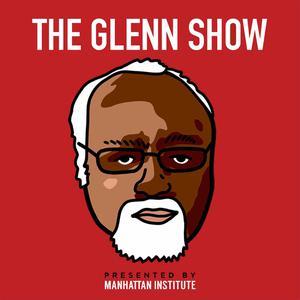 The Glenn Show
The Glenn Show